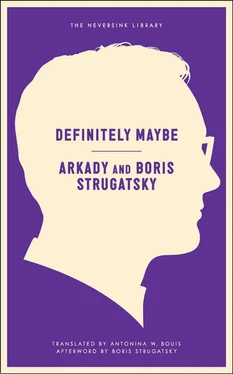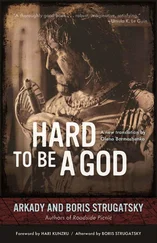I carefully put the passport on the edge of the table and tiptoed to the bedroom. I broke out in another sweat. The woman lying under the sheet had dry skin, pulled taut on her face, and her upper teeth, white and sharp, were exposed, either in a smile or in a martyred grin. That was a witch there under my sheets. Forgetting myself, I shook her by her naked shoulder. Irina woke up immediately, opened her huge eyes, and muttered: “Dmitri, what’s the matter? Does something hurt?” God, it was Irina. Of course it was Irina. What a nightmare. “I was snoring, right?” she asked in a sleepy voice and went back to sleep.
I tiptoed back to the kitchen, moved the passport away from me, took out the last cigarette, and lit up. Yes. That’s how we live now. That’s what our life will be now. From now on.
The icy animal inside me stirred some more, and then was still. I wiped the disgusting sweat from my face; I had an idea and started digging through her purse. Irina’s passport was in there. Malianova, Irina Ermolaevna. Date of birth: 1933. Damn! All right, why did they need to do that? This was no accident. The passport, the telegram, Irina’s difficult journey, the fact that she had to fly in a plane with coffins—all that wasn’t accidental. Or was it? They were blind, Mother Nature, brainless natural elements. That’s a good case for Vecherovsky’s theory. If it was the Homeostatic Universe quelling a microrebellion, that’s just how it should have seemed. Like a man swatting a fly with a towel—vicious, whistling blows cutting through the air; vases tumbling from shelves; lamps breaking; innocent moths falling victim to the blows; the cat, its paw stomped on, making a beeline for the couch. Massed power and inefficiency. I mean, I really don’t know anything. Maybe somewhere on the other side of town a house collapsed. They were aiming for me and hit the house instead. And all I got was the crummy passport. And all this because I thought of the M cavities the other day? To think that I could have told Irina about them!
Listen, I probably won’t be able to live like this. I never thought of myself as a coward, but living like this, without a moment’s peace, terrified by your own wife because you’ve taken her for a witch. And Vecherovsky despises Glukhov. That means he’ll stop seeing me, too. I’ll have to change everything. Everything will be different. Different friends, different work, a different life. Maybe even a different family. “Since then crooked, roundabout, godforsaken paths stretch out before me.” And you’ll be ashamed to look at yourself in the mirror when you’re shaving in the morning. The mirror will reflect a very small and very tame Malianov.
Of course, you can get used to it, you can probably get used to everything in the world. To any waste. But this would be no little waste. I’ve spent ten years working toward this. More than ten years—my whole life. Since childhood, since the school science club, since the homemade telescopes, since the calculations of Wolfe’s numbers according to someone’s observations. My M cavities, I really don’t know anything about them: what I might have done with them; what someone else might have done with them after me; continuing, developing, adding to it and passing it on to another age, the next century. Probably something not so minor might have come of it; I was losing something not so minor if it could lead to revelations that the universe itself is trying to stop. A billion years is a long time. In a billion years a civilization develops from a blob of slime—
But they’ll squash me. First they won’t let me live in peace, they’ll drive me crazy, and if that won’t work, they’ll simply squash me. Oh boy! Six o’clock. The sun was broiling already. And then, I don’t know why, the cold animal in my chest disappeared. I stood up. Moving calmly, I went into the room and got my papers and a pen from the desk. I went back to the kitchen, settled down, and started to work.
I couldn’t think well—my head was stuffed with cotton and my eyelids burned—but I carefully went through my notes, throwing out everything that was no longer necessary, put the rest in order, and copied it all into a notebook, slowly, with pleasure, carefully choosing my words, as though I were writing a final draft of an article or a report.
A lot of people don’t like this stage of the work, but I do. I like polishing my terms, savoring the choice of the most elegant and economic turns of phrase, catching the mistakes hidden in the notes, plotting graphs, preparing tables. This is the scientist’s noble dirty work—the summation, a time for admiring oneself and one’s handiwork.
And I admired myself and my handiwork until Irina was next to me—hugging me with her bare arm and pressing her warm cheek against mine.
“Huh?” I said and straightened my back.
It was my usual Irina, and not that pathetic scarecrow she resembled yesterday. She was rosy and fresh, clear-eyed and jolly. A lark. She’s a lark. I’m an owl, and she’s a lark. I’d read about a classification like that somewhere. Larks go to bed early, sleep readily and with great pleasure, and wake up fresh and happy and start singing right away, and there’s nothing in the world that will make them sleep until noon.
“You didn’t sleep at all again?” she asked, and without waiting for an answer went to the balcony door. “What are they hollering about?”
I only then realized that there was a ruckus in our courtyard—the kind of crowd noises heard at the scene of an accident after the police have arrived and before the ambulance.
“Dmitri!” Irina shouted. “Look! Talk about miracles!”
My heart fell. I know those miracles. I jumped up…
Excerpt 19 …. some coffee. And Irina announced cheerfully that everything had worked out marvelously. Finally, everything in the world was turning out marvelously. She had gotten sick of Odessa over those ten days because this summer it was more crowded than ever. She missed me and had no intention of going back to Odessa, particularly since she’d never be able to get a ticket, and her mother was planning to come to Leningrad in August; she could bring Bobchik then. Now she was going back to work, right now, as soon as she’d had her coffee, and in March or April we’d go skiing together in Kirovsk as we had planned.
We had a tomato omelet. While I cooked it, Irina combed the whole apartment looking for cigarettes, didn’t find any and got a little blue, made more coffee, and asked about Snegovoi. I told her what I knew from Zykov—carefully avoiding all sharp angles and trying to present it as the usual tragic story. I remembered the beautiful Lidochka in the middle of my tale and almost brought her up but bit my tongue.
Irina was saying something about Snegovoi, remembered something, and the corners of her mouth drooped sadly (“… now there’s nobody to borrow a cigarette from!”), and I sipped my coffee, thinking about what to do next. Until I decided to tell Irina or not, it was probably better not to mention Lidochka or the grocery order since that whole matter was rather unclear, or should I say very clear, since in all this time Irina hadn’t said a word about her friend or her grocery order. Of course, Irina might have forgotten. First of all, all that anxiety, and second of all, Irina always forgets everything, but for the time being—Satan, get thee behind me—it was better to skirt the issues. Well, maybe it was better to send out a small trial balloon.
Choosing an appropriate moment, when Irina had stopped talking about Snegovoi and had gone on to cheerier topics, how Bobchik had fallen into a ditch and my mother-in-law after him, I asked casually:
“Well, and how’s Lidochka doing?”
My small trial balloon turned out to be on the huge and clumsy side. Irina’s eyes bulged.
Читать дальше












